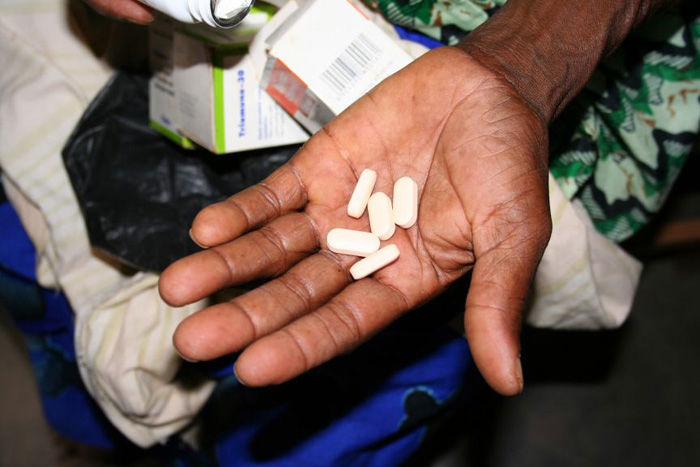The prototype of a new tool for rapidly measuring the viral load of HIV, named SAMBA (Simple AMplification Based Assay), is currently being evaluated at our AIDS programme in Chiradzulu in Malawi. If the results of this trial are positive, the implementation of this test will represent a net improvement in the care of HIV-positive patients in African countries.
The plasma viral load reflects HIV-AIDS activity, i.e. the multiplication of viral particles (also called “HIV-RNA” or “copies”) circulating in the blood. Measurement of this viral load allows the progression of the disease to be followed.
This biological test is essential to determine the effectiveness of anti-retroviral treatments (ARV). It is measured using a simple blood sample, based on the amount of HIV-RNA (or copies) per millilitre of blood (HIV-RNA/ml). A detectable viral load is usually the sign of the start of resistance to ARV treatments. It is therefore important to detect a treatment failure very quickly in order to avoid an accumulation of mutations which would make second-line treatments less effective.
In wealthy countries, the viral load is the main indicator used to monitor the state of HIV-positive patients. In African countries, viral load analysis (which must be carried out in highly specialised laboratories) is very often inaccessible or too time-consuming. There are currently just two laboratories in the whole of Malawi that are capable of carrying out this analysis.
A rapid viral load test usable by non-specialised laboratories. Established in 1997, the objective of the Diagnostics Development Unit (DDU) at the University of Cambridge in the United Kingdom is to develop tests that are innovative, quick, simple, inexpensive, more efficient and adapted to difficult conditions.
With this in mind, the DDU has developed a new tool for rapidly measuring the viral load, named SAMBA (Simple AMplification Based Assay), which allows the presence of the virus to be detected above a certain threshold. Operation and interpretation of the results are quite simple (reading of a strip) and do not require the expertise of a molecular biology technician. But in its current state of development, SAMBA requires the use of three electrical devices, which for the time being still limits its implementation in a country like Malawi.
In collaboration with the DDU and the Malawi Ministry of Health, MSF took part in a clinical trial of SAMBA under real conditions, as part of its HIV-AIDS treatment programme at Chiradzulu. This feasibility study should determine whether this test can be used by local personnel in rural hospital laboratories, and measure its effectiveness with adult HIV-positive patients (except pregnant women and hospitalised patients) whether they are undergoing treatment or not. The entire study will take place within the Chiradzulu district hospital, particularly in the HIV-AIDS consultation service and in the laboratory, using a sample of 100 to 200 patients.
“Even though at present this test only works with a traditional energy source, we hope to eventually have even more simplified technology in order to be able to use it at an even more local level, in health centres. If the SAMBA study produces positive results, it should be introduced as quickly as possible. This will allow an enormous improvement in patient care. This test should also allow more qualified laboratory technicians to concentrate on carrying out more complex tests”, hopes Monique GUEGUEN, clinical pathologist at MSF.
10 years of ARV...
In 1995, MSF started an HIV-AIDS treatment programme in Malawi, in the rural district of Chiradzulu and in collaboration with the Ministry of Health. The first ARV treatments were offered in 2001. At the start of 2011, we are treating more than 27,000 patients, 18,000 of whom are receiving ARV treatments.
Today, MSF supports HIV-AIDS treatment programmes in 11 health centres in the Chiradzulu district. MSF also works in the hospital, especially in the service dedicated to tuberculosis, where the mortality rate is the highest and the proportion of HIV-positive patients is greatest. MSF also supports the Ministry of Health in setting up services to prevent the transmission of HIV-AIDS from mother to child in each of these centres. Every month, more than 650 people join our programme. More than 300 of these immediately start ARV treatment.
Our team consists of around 20 international staff members on average, and around 200 local staff memebers. MSF also pays an additional salary to around 150 personnel from the Ministry of Health.
The Belgian section of MSF works in the district of Thyolo, where they also run an HIV-AIDS treatment programme.


